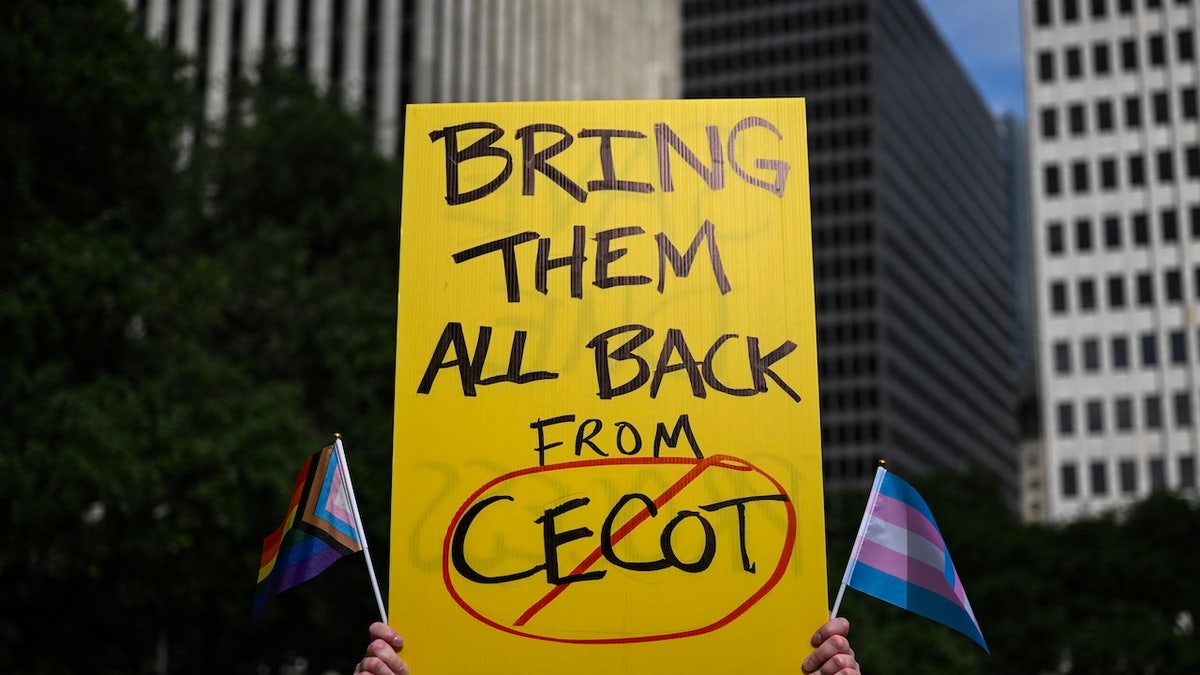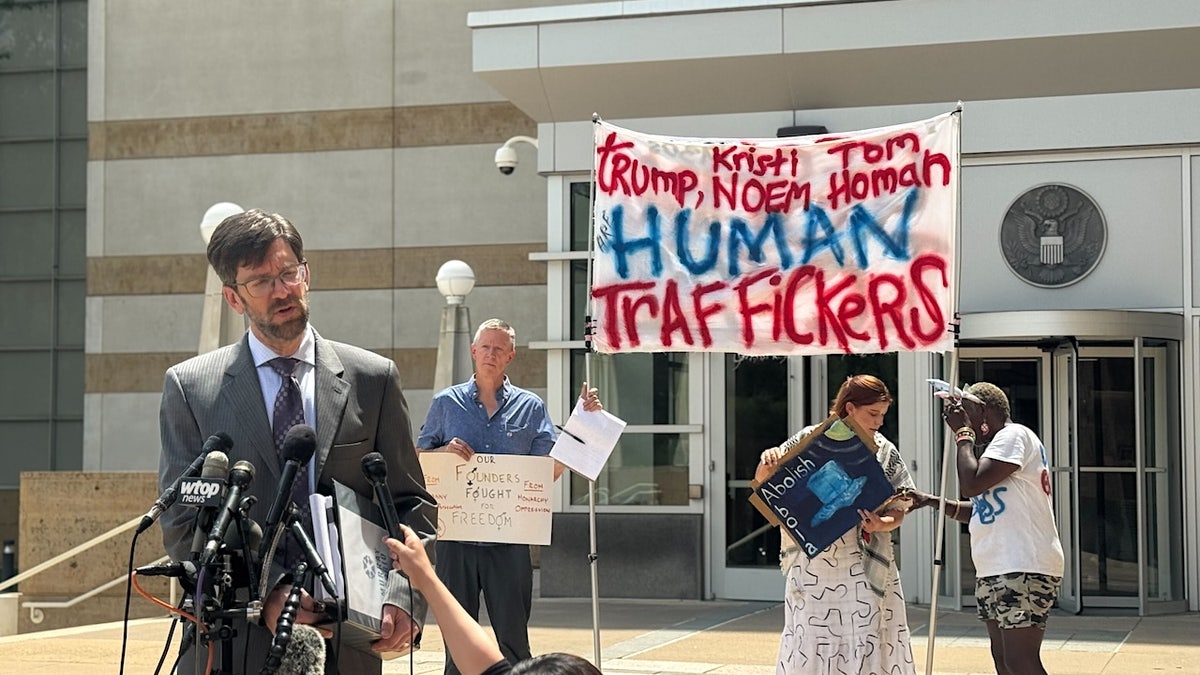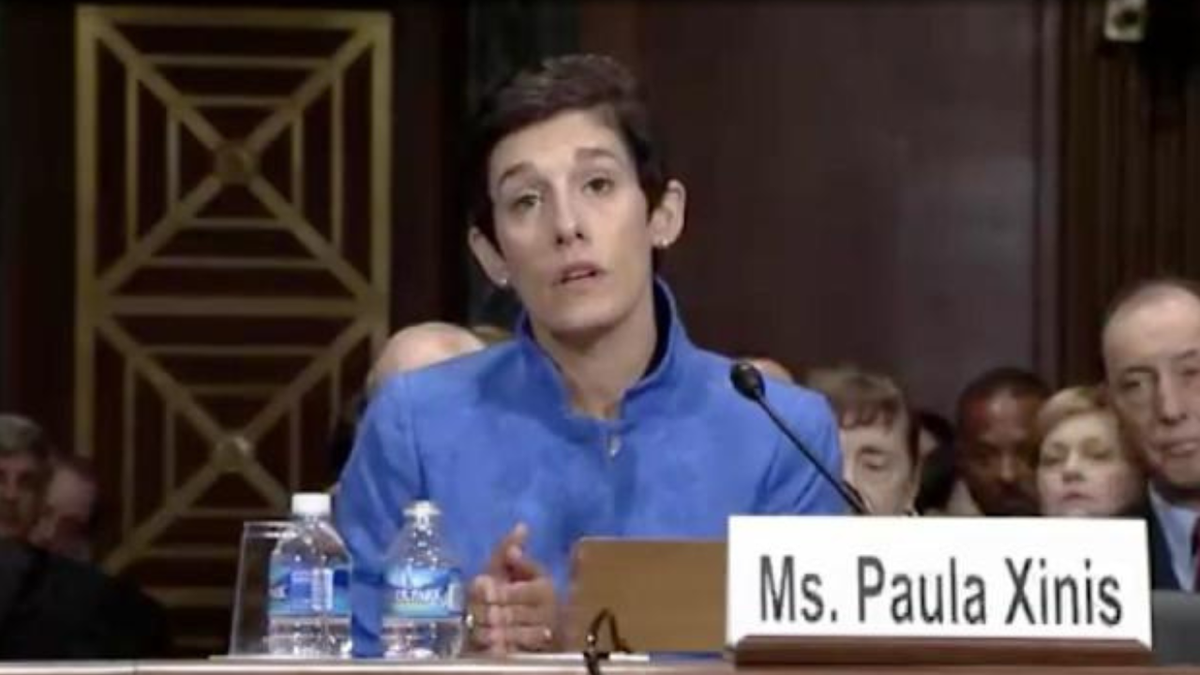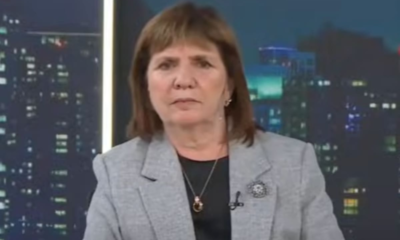INTERNACIONAL
‘Not our role’: Lawmakers cautious over Middle East peace, not ready for regime change

NEWYou can now listen to Fox News articles!
Lawmakers are anxious that the fragile ceasefire between Israel and Iran may not hold, but many are not ready to call for regime change in the Islamic Republic.
President Donald Trump on Monday announced that Israel and Iran had agreed to a truce, but as the evening carried into the wee hours of Tuesday morning, whether that peace would last came into question.
TRUMP NOMINATED FOR NOBEL PEACE PRIZE OVER IRAN-ISRAEL CEASEFIRE DEAL
President Donald Trump lashes out at Israel and Iran with profanity for breaking the ceasefire. (Tasos Katopodis/Getty Images)
Israel had reportedly geared up for a retaliatory bombing run against Iran, and Trump accused both of breaking the newborn truce. On Tuesday morning, the president put out a sharp reprimand against both countries.
«We basically have two countries that have been fighting so long and so hard that they don’t know what the f— they’re doing,» he told reporters.
On Capitol Hill, in the immediate wake of the ceasefire announcement, lawmakers were already looking at the deal skeptically but had confidence that the president’s negotiating power would ensure the fragile truce was not shattered.
«I remain hopeful,» Rep. Nancy Mace, R-S.C., told Fox News Digital. «I trust the president. He’s been right on everything, and he’s the only president that’s been able to bring Iran and Israel to the table in this manner. So I’m going to hope and pray that this works, and if it doesn’t, then we know Trump will act decisively.»
‘NOT CONSTITUTIONAL’: CONGRESS INVOKES NEW WAR POWERS RESOLUTION TO REJECT TRUMP’S STRIKES ON IRAN

Rep. Nancy Mac, R-S.C. (Rep. Nancy Mac, R-S.C.)
Trump’s announcement came on the heels of a weekend strikes with bunker-busting bombs that the White House says obliterated Iran’s nuclear program. Many lawmakers stood firm last week that the entire point of supporting Israel in their bombing campaign against the Islamic Republic was to ensure that Iran could not make or obtain an atomic weapon.
Sen. Eric Schmitt, R-Mo., told Fox News Digital that it was the groundwork Trump laid in his first term with the Abraham Accords and his recent visit to Saudi Arabia that could help solidify a lasting ceasefire between the two sides.
«All you can do is just trust that because of the events that have happened, I mean, Iran … their conventional weapons have been decimated, their platforms have been decimated,» he said. «Their nuclear program has been obliterated. So they’re at the table because of that.»
Sen. John Hoeven, R-N.D., told Fox News Digital that Iran has «typically never done what they said they would do.»
However, he believed that with the pressure from both the U.S. and Israel, and because Trump was willing to use force — which he described as the president showing he «means business» — things could be different.
«I think they’re going to come to the table now, and they’re in a very weak position, so it’s different, but their track record is very bad,» he said. «You can’t count on what they say. So this goes back to the Reagan ‘trust but verify.’ Anything we negotiate with them has to be verifiable, and certainly that’s how the administration is going to approach it.»
However, even with a ceasefire, the Iranian regime remains unchanged. A shared sentiment among many lawmakers, however, was that if regime change were to take place in Tehran, it would have to be up to the Iranian people, not the U.S. government.
Virginia Sen. Tim Kaine, who is pushing for his war powers resolution to get a vote in the upper chamber, warned, «Do we really want to get in another regime-change war?
«We changed Iran’s regime in 1953 by leading a coup against their prime minister,» Kaine said. «And that’s one of the reasons why the U.S.-Iran relationship is so bad 70 years later. Do we really want to do that again?»
TRUMP ‘DOESN’T NEED PERMISSION’ FROM CONGRESS TO STRIKE IRAN, EXPERT SAYS

Sen. Steve Daines speaks at the Dirksen Senate Office Building on Jan. 15, 2025, in Washington, D.C. (Kevin Dietsch/Getty Images)
Indeed, the U.S.-backed toppling of then-Prime Minister Mohammad Mosaddegh opened the door for Shah Mohammad Reza Pahlavi to take control of Iran. However, by 1979, the Islamic Revolution took place and removed Pahlavi from power and saw the birth of the current regime.
Rep. Jack Bergman, a retired Marine general, laid out his position against regime change in more succinct terms. «It’s not our role.»
Sen. Steve Daines, R-Mont., lauded the president’s action over the weekend and said he believed the strikes had put negotiations on a path that could lead to a «generational shift» regarding the future peace and stability of the Middle East and Western World.
Still, he noted that «regime changes can break one or two ways, but it would be hard to do worse than what is there today.»
«I’m cautiously optimistic, but we’re not there yet,» he continued.
CLICK HERE TO GET THE FOX NEWS APP
Not every lawmaker shared the same feelings, however.
Rep. Ryan Zinke, R-Mont., told Fox News Digital that he believed the U.S. should take a stronger posture when it comes to regime change in Iran.
«I’m a Navy SEAL commander who spent time there, and buried a lot of my friends,» he said. «While the attack was brilliant, and it was deceptive, and it made a statement, etcetera, etcetera, I don’t think Iran will bend. I think it’s going to take regime change.»
INTERNACIONAL
Federal judge limits Trump’s ability to deport Abrego Garcia after lengthy court battle

NEWYou can now listen to Fox News articles!
Greenbelt, Md. – A federal judge in Maryland issued an emergency ruling Wednesday blocking the Trump administration from immediately taking Salvadorian migrant Kilmar Abrego Garcia into ICE custody for 72 hours after he is released from criminal custody in Nashville, Tennessee — attempting to slow, if only temporarily, a case at the center of a legal and political maelstrom.
U.S. District Judge Paula Xinis said in her order that the government must refrain from immediately taking Abrego into ICE custody pending release from criminal custody in Tennessee, and ordered he be returned to the ICE Order of Supervision at the Baltimore Field Office— the closest ICE facility near the district of Maryland where Abrego was arrested earlier this year.
Xinis said at an evidentiary hearing this month that she would take action soon, in anticipation of a looming detention hearing for Abrego Garcia in his criminal case. She said she planned to issue the order with sufficient time to block the Trump administration’s stated plans to immediately begin the process of deporting Abrego Garcia again upon release — this time to a third country such as Mexico or South Sudan.
Xinis’s order said the additional time will ensure Abrego can raise any credible fears of removal to a third country, and via «the appropriate channels in the immigration process.» She also ordered the government to provide Abrego and his attorneys with «immediate written notice» of plans to transport him to a third country, again with the 72-hour notice period, «so that Abrego Garcia may assert claims of credible fear or seek any other relief available to him under the law and the Constitution.»
TRUMP HAS CUSTODY OVER JAILED CECOT MIGRANTS, EL SALVADOR SAYS, COMPLICATING COURT FIGHTS
Demonstrators gather outside the U.S. District Court in Greenbelt, Maryland, to protest the Trump administration’s deportation of Kilmar Abrego Garcia, who was sent to El Salvador in March in what administration officials said was an administrative error, on July 7, 2025. (Breanne Deppisch/Fox News Digital)
Xinis said in her order Wednesday that the 72-hour notice period is necessary «to prevent a repeat of Abrego Garcia’s unlawful deportation to El Salvador by way of third-country removal.»
«Defendants have taken no concrete steps to ensure that any prospective third country would not summarily return Abrego Garcia to El Salvador in an end-run around the very withholding order that offers him uncontroverted protection,» she said.
The order from Xinis, who presided over Abrego Garcia’s civil case, was ultimately handed down on Wednesday just two minutes after a federal judge in Nashville — U.S. District Judge Waverly Crenshaw — issued a separate order, upholding a lower judge’s decision that Abrego should be released from criminal custody pending trial in January.
Crenshaw said in his order that the government failed to provide «any evidence that there is something in Abrego’s history at warrants detention.»
The plans, which Xinis ascertained over the course of a multi-day evidentiary hearing earlier this month, capped an exhausting, 19-week legal saga in the case of Abrego Garcia that spanned two continents, multiple federal courts, including the Supreme Court, and inspired countless hours of news coverage.
Still, it ultimately yielded little in the way of new answers, and Xinis likened the process to «nailing Jell-O to a wall,» and «beating a frustrated and dead horse,» among other things.
«We operate as government of laws,» she scolded lawyers for the Trump administration in one of many terse exchanges. «We don’t operate as a government of ’take my word for it.’»
FEDERAL JUDGE EXTENDS ARGUMENTS IN ABREGO GARCIA CASE, SLAMS ICE WITNESS WHO ‘KNEW NOTHING’

A person holds up a sign referencing the the CECOT prison in El Salvador during demonstration against President Donald Trump and his immigration policies in Houston, Texas, on May 1, 2025. (Photo: AFP va Getty Images) (AFP via Getty)
Xinis had repeatedly floated the notion of a temporary restraining order, or TRO, to ensure certain safeguards were in place to keep Abrego Garcia in ICE custody, and appeared to agree with his attorneys that such an order is likely needed to prevent their client from being removed again, without access to counsel or without a chance to appeal his country of removal.
«I’m just trying to understand what you’re trying to do,» Xinis said on more than one occasion, growing visibly frustrated.
«I’m deeply concerned that if there’s no restraint on you, Abrego will be on another plane to another country,» she told the Justice Department, noting pointedly that «that’s what you’ve done in other cases.»
Those concerns were echoed repeatedly by Abrego Garcia’s attorneys in a court filing earlier this month.
They noted the number of times that the Trump administration has appeared to have undercut or misrepresented its position before the court in months past, as Xinis attempted to ascertain the status of Abrego Garcia in El Salvador, and what efforts, if any, the Trump administration was making to comply with a court order to facilitate his return.
The Trump administration, who reiterated their belief that the case is no longer in her jurisdiction, will almost certainly move to immediately appeal the restraining order to a higher court.
TRUMP HAS CUSTODY OVER JAILED CECOT MIGRANTS, EL SALVADOR SAYS, COMPLICATING COURT FIGHTS

Demonstrators gather cheering and chanting slogans, during the nationwide «Hands Off!» protest against Trump in Boston, Massachusetts on April 5, 2025. (Joseph Prezioso / AFP via Getty)
The order comes two weeks after an extraordinary, multi-day evidentiary hearing in Greenbelt, Maryland, where Xinis sparred with Trump administration officials as she attempted to make sense of their remarks and ascertain their next steps as they look to deport Abrego Garcia to a third country.
She said she planned to issue the order before the date that Abrego could possibly be released from federal custody— a request made by lawyers for Abrego Garcia, who asked the court for more time in criminal custody, citing the many countries he might suffer persecution in — and concerns about what legal status he would have in the third country of removal.
Without legal status in Mexico, Xinis said, it would likely be a «quick road» to being deported by the country’s government to El Salvador, in violation of the withholding of removal order.
And in South Sudan, another country DHS is apparently considering, lawyers for Abrego noted the State Department currently has a Level 4 advisory in place discouraging U.S. travel due to violence and armed conflict.
Americans who do travel there should «draft a will» beforehand and designate insurance beneficiaries, according to official guidance on the site.
FEDERAL PROSECUTORS TELL JUDGE THEY WILL DEPORT KILMAR ABREGO GARCIA TO A THIRD COUNTRY AFTER DETENTION

Abrego Garcia’s attorneys speak to reporters outside the U.S. District Court in Greenbelt, Maryland, in July. (Breanne Deppisch/Fox News Digital) (Breanne Deppisch/Fox News Digital)
In court, both in July and in earlier hearings, Xinis struggled to keep her own frustration and her incredulity at bay after months of back-and-forth with Justice Department attorneys.
Xinis has presided over Abrego Garcia’s civil case since March, when he was deported to El Salvador in violation of an existing court order in what Trump administration officials described as an «administrative error.»
She spent hours pressing Justice Department officials, over the course of three separate hearings, for details on the government’s plans for removing Abrego Garcia to a third country — a process she likened to «trying to nail Jell-O to a wall.»
Xinis chastised the Justice Department this month for presenting a DHS witness to testify under oath about ICE’s plans to deport Abrego Garcia, fuming that the official, Thomas Giles, «knew nothing» about his case, and made no effort to ascertain answers — despite his rank as ICE’s third-highest enforcement official.
The four hours of testimony he provided was «fairly stunning,» and «insulting to her intelligence,» Xinis said.
Ultimately, the court would not allow the «unfettered release» of Abrego Garcia pending release from federal custody in Tennessee without «full-throated assurances» from the Trump administration that it will keep Abrego Garcia in ICE custody for a set period of time and locally, Xinis said, to ensure immigration officials do not «spirit him away to Nome, Alaska.»
During the July hearing, Judge Xinis notably declined to weigh in on the request for sanctions filed by lawyers for Abrego Garcia, but alluded to it in her ruling Wednesday.
«Defendants’ defiance and foot- dragging are, to be sure, the subject of a separate sanctions motion,» she said in the ruling— indicating further steps could be taken as she attempts to square months of differing statements from Trump officials.
«The Court will not recount this troubling history in detail, other than to note Defendants’ persistent lack of transparency with the tribunal adds to why further injunctive relief is warranted,» she said.
TRUMP’S REMARKS COULD COME BACK TO BITE HIM IN ABREGO GARCIA DEPORTATION BATTLE

This still from video from July 22, 2015 show Paula Xinis from US Senate Judiciary Committee (US Senate Judiciary Committee)
The Justice Department, after a short recess, declined to agree, prompting Xinis to proceed with her plans for the TRO.
Xinis told the court that ultimately, «much delta» remains between where they ended things in court, and what she is comfortable with, given the government’s actions in the past.
This was apparent on multiple occasions Friday, when Xinis told lawyers for the Trump administration that she «isn’t buying» their arguments or doesn’t «have faith» in the statements they made — reflecting an erosion of trust that could prove damaging in the longer-term.
The hearings this week capped months of back-and-forth between Xinis and the Trump administration, as she tried, over the course of 19 weeks, to track the status of a single migrant deported erroneously by the Trump administration to El Salvador—and to trace what attempts, if any, they had made facilitate his return to the U.S.
CLICK TO GET THE FOX NEWS APP
Xinis previously took aim at what she deemed to be the lack of information submitted to the court as part of an expedited discovery process she ordered this year, describing the government’s submissions as «vague, evasive and incomplete»— and which she said demonstrated «willful and bad faith refusal to comply with discovery obligations.»
On Friday, she echoed this view. «You have taken the presumption of regularity and you’ve destroyed it, in my view,» Xinis said.
INTERNACIONAL
Russian plane carrying dozens of passengers crashes in country’s Far East

NEWYou can now listen to Fox News articles!
A plane carrying nearly 50 people on board reportedly crashed in Russia’s Far East on Thursday and local emergency services have located the wreckage.
The country’s Emergency Situations Ministry said search crews found the plane’s burning fuselage on a hillside south of its planned destination in the town of Tynda, which is located near the Russia’s border with China.
Images of the reported crash site circulated by Russian state media show debris scattered among dense forest, surrounded by plumes of smoke.
LONDON-BOUND PLANE CARRYING MORE THAN 200 PEOPLE CRASHES AFTER TAKEOFF IN INDIA
An An-24 aircraft of Angara Airlines lands at the airport of Irkutsk, Russia April 13, 2014. (REUTERS/Marina Lystseva/File Photo)
An initial aerial inspection of the site suggested that there were no survivors, Russia’s Interfax news agency said, citing unnamed sources in the emergency services. Its sources also said that there were difficult weather conditions in the area.
The transport prosecutor’s office said the plane attempted a second approach while trying to land when contact with it was lost.
Forty-three passengers, including five children, as well as six crew members were on board the An-24 passenger plane as it traveled from the city of Blagoveshchensk on the Russian-Chinese border to the town of Tynda, regional Gov. Vasily Orlov said.
CLICK HERE TO GET THE FOX NEWS APP
Russia’s Emergency Situations Ministry reported that 48 people were on board the flight, which was operated by Siberia-based Angara Airlines. The reason for the discrepancy was not immediately clear.
The Associated Press contributed to this report.
This is a developing story. Check back for updates.
INTERNACIONAL
Irán: el miedo a otra guerra con Israel y el regreso de las sanciones de la ONU inquietan a los habitantes de Teherán

La amenaza del snapback
Las cartas de Teherán

 POLITICA2 días ago
POLITICA2 días ago🗳️ El chamuyo de las elecciones en la Provincia: se postulan, pero no a asumen

 POLITICA2 días ago
POLITICA2 días agoFuerte malestar en la CGT por la ausencia de gremialistas en las listas bonaerenses del peronismo

 CHIMENTOS2 días ago
CHIMENTOS2 días agoEl desgarrador testimonio del hermano de Locomotora Oliveras: “El daño es irreversible, solo puede vivir con respirador”
























